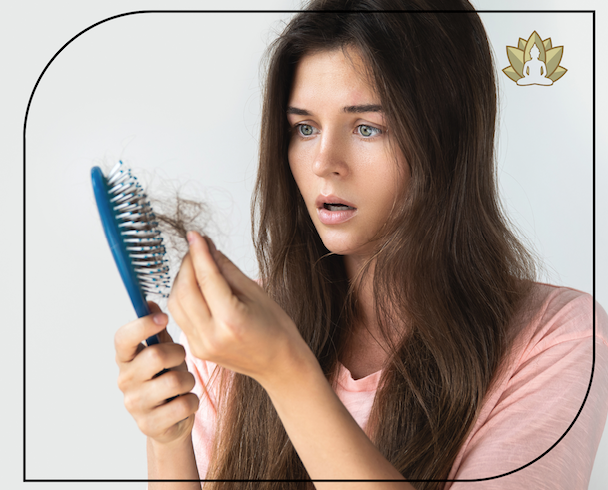
Are you seeing signs of hair loss? If yes, take action now before it is too late!
In the age, we are living right now, it’s not a question of if your hair is damaged but of how bad the situation really is! Before it becomes too obvious and you clearly notice your hair thinning out, it is time that we give some importance to our hair care!
Hair is an important part of our physical appearance and hair loss can lead to lower self-esteem. Our hair plays a significant role in how we perceive ourselves and how others perceive us. Hair loss or damage can indeed affect self-esteem and confidence levels. That’s why it’s essential to prioritize hair care and seek solutions if problems arise. Whether it’s through proper maintenance, seeking advice from a dermatologist or hair specialist, or exploring treatment options, addressing hair concerns can help boost self-esteem and overall well-being.
With factors like pollution, stress, poor diet, and harsh styling habits, it’s common for our hair to experience damage over time. Taking proactive steps to care for our hair can make a significant difference in its health and appearance. From using gentle hair care products to maintaining a balanced diet and minimizing chemical and heat styling, there are many ways to promote hair health and prevent further damage. It’s all about finding the right routine that works for you and your hair type.
Hormonal changes during menopause can have a significant impact on hair health and may lead to hair loss in women. Androgenic alopecia, also known as female pattern hair loss, is indeed the most common type of hair loss experienced by women during menopause.
During menopause, fluctuations in hormone levels, particularly a decrease in estrogen and an increase in androgens (such as testosterone), can affect the hair growth cycle and lead to miniaturization of hair follicles. This can result in hair thinning, especially in the central part of the scalp.
Managing hormonal changes during menopause and addressing hair loss often involves a combination of approaches, including hormone replacement therapy (HRT), medications like minoxidil to stimulate hair growth, and lifestyle changes to support overall health and hair vitality. Consulting with a healthcare provider or dermatologist can help women navigate these changes and find the most appropriate treatment options for their individual needs.
Chronic inflammation and autoimmunity are two major underlying issues behind female hair loss. Conditions such as alopecia areata, in which the immune system mistakenly attacks hair follicles, can lead to significant hair thinning or loss. Additionally, chronic inflammation in the scalp can disrupt the hair growth cycle and contribute to conditions like telogen effluvium.
Addressing these underlying issues often requires a multifaceted approach, which may include medical treatments to manage inflammation and autoimmune responses, lifestyle changes to reduce inflammation, and targeted hair care to support scalp health and promote hair growth.
Chronic stress and Poor sleep may also contribute to female hair loss. They both may increase chronic inflammation, which is a common root cause factor behind hair loss as mentioned earlier. Both factors can increase levels of cortisol, a stress hormone, in the body, which can lead to inflammation and disrupt the hair growth cycle.
Addressing chronic stress and prioritizing quality sleep are essential steps in promoting overall health and hair wellness. Techniques such as mindfulness, meditation, exercise, and establishing a consistent sleep routine can help manage stress levels and improve sleep quality, ultimately supporting hair health. Additionally, seeking professional help from a healthcare provider or therapist may be beneficial for managing chronic stress and its impact on hair loss.
Environmental toxins are all around us, including air pollution, cigarette smoke, mold, plastics, toxins in municipal tap water, chemicals in cosmetics, body, hygiene, and cleaning products, heavy metals, and so on. A high toxin load may increase the risk of chronic inflammation, gut health issues, and autoimmunity and, as a result, may contribute to hair loss. These factors can, in turn, contribute to various hair loss conditions. Reducing exposure to environmental toxins and adopting a more natural and toxin-free lifestyle can be beneficial for overall health and hair wellness. This may include using natural or organic hair care products, filtering tap water, minimizing exposure to air pollutants, and choosing environmentally friendly cleaning and personal care products.
Additionally, supporting detoxification pathways in the body through a healthy diet, adequate hydration, and regular exercise can help mitigate the effects of environmental toxins and promote hair health.
Chronic infections can also impact hair health and potentially contribute to hair loss. Certain infections, particularly those that affect the scalp or hair follicles directly, can disrupt the normal growth cycle of hair and lead to shedding or thinning.
For example, fungal infections of the scalp, such as tinea capitis can cause inflammation and damage to the hair follicles, resulting in hair loss. Additionally, chronic bacterial infections or conditions like seborrheic dermatitis, which is characterized by inflammation and flaking of the scalp, can also affect hair growth.
Addressing underlying infections through appropriate medical treatment, such as anti fungal or antibacterial medications, is essential for resolving the issue and promoting hair regrowth.
Want to learn more on this topic, consider taking up our self-paced online course
HOLISTIC SOLUTIONS FOR HAIRLOSS
Use coupon code: LEARNINGFORLIFE at checkout to get your 75% discount. (limited time discount)
Don’t miss out on this chance to embark on a transformative path to wellness!
Looking forward to connecting with you and helping you in your journey towards better health!
NAMASTE,

Preeti Syal
M.Sc., R.H.N., Certified Ayurvedic Lifestyle Consultant
The content provided in my blogs are for knowledge sharing purposes only and is not intended to be a substitute for professional medical advice, diagnosis or treatment.



